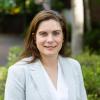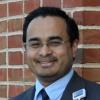Biomedical Imaging
UVA engineers are making major contributions to the future of biomedical imaging, addressing unmet clinical needs and basic science questions. We are discovering new systems and contrast agents to interrogate anatomy and function at the molecular, cellular, tissue, and organ scales, improving guidance and application of medical therapies,and integrating imaging data with other big data.
BME Primary Faculty in this Area

Frederick H. Epstein, Ph.D.
Dr. Epstein is a world leader in advancing MRI myocardial strain imaging by developing and applying the cine DENSE (displacement encoding using stimulated echoes) MRI method.

Brent A. French, Ph.D.
Brent A. French combines advanced methods of targeted drug and gene delivery with biomedical imaging in vivo to explore novel targets and treatment strategies in cardiovascular disease. Research interests of the Molecular Bioengineering Lab focus on developing new, more effective strategies for treating and preventing human disease.

Kimberly A. Kelly, Ph.D.
Kimberly Kelly uses computational methods and bioinformatics to develop more effective and less toxic cancer drugs through the identification of disease-relevant druggable targets, with a special emphasis on translation to the clinic and commercialization.

Kelsey Kubelick, Ph.D.
Kelsey Kubelick leverages light, sound, nanoconstruct design and cellular engineering strategies to develop advanced theranostic imaging platforms. With a special interest in ultrasound and photoacoustics, her lab creates imaging tools that play a critical role in informing, guiding and enhancing therapies across a range of biomedical applications.

Craig H. Meyer, Ph.D.

Gustavo Kunde Rohde, Ph.D.
Dr. Rohde develops computational predictive models with applications in pathology, radiology, systems biology, and mobile sensing.
Natasha Diba Sheybani, Ph.D.
Dr. Sheybani leads a translational research program centered on innovating tools and paradigms for non-invasive precision cancer management.
Joint Faculty in Biomedical Imaging

Bijoy Kumar Kundu
Bijoy K. Kundu, PhD, is an Associate Professor in the tenure track in the department of Radiology and Medical Imaging at UVA. The goals of his lab are to develop and optimize quantitative cardiac PET imaging techniques to address the hypothesis of metabolic remodeling in small animal modelsof myocardial injury and type 2 diabetes.

G. Wilson Miller
The development of new pulse-sequence techniques, contrast mechanisms, and hardware for magnetic resonance (MR) imaging of the lung and MR-guided focused ultrasound of the brain. See Research Projects List below.